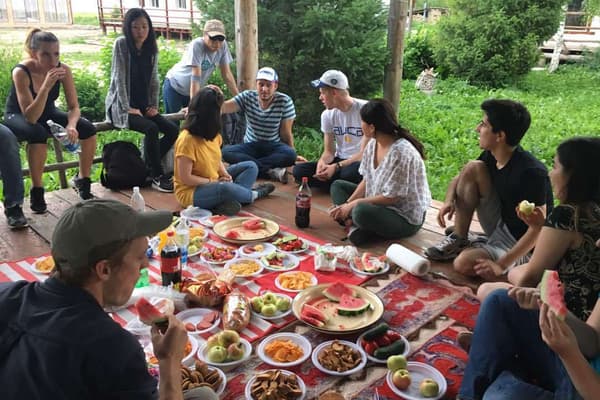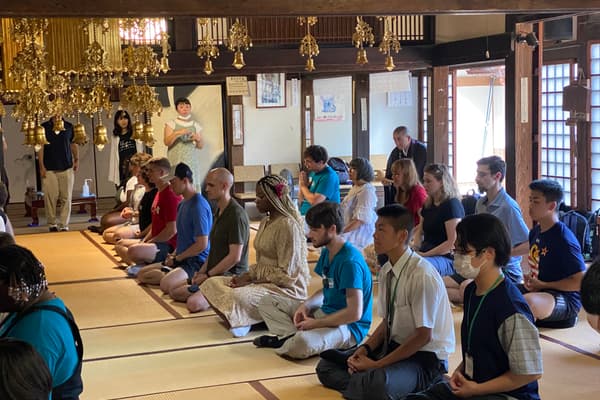Planning for Your Health and Safety
The health and safety of participants is the CLS Program’s highest priority. The CLS Program and its host institutes abroad have put in place many policies to promote participant safety, but participants themselves also play a key role in caring for their own health, safety, and well-being. In advance of the program, finalists should consider all aspects of their own health, speak to their physician(s) about any concerns, and collaborate with their medical professional(s) to develop a plan for staying mentally and physically healthy while abroad.
Accident and Sickness Coverage for Exchanges (ASPE)
All participants are strongly encouraged to be covered by a primary U.S health insurance policy for the duration of the CLS Program. The regular health coverage of participants is supplemented by limited emergency and accident medical coverage from the Accident and Sickness Program for Exchanges (ASPE), provided by the Bureau of Educational and Cultural Affairs of the U.S. Department of State. ASPE works primarily on a reimbursement basis. Participants should be prepared to pay up to approximately $500 for medical treatment abroad out of pocket. Participants should secure receipts from all services provided and use the receipts to apply for reimbursement.
Leaving the CLS country during the program is prohibited, and if a participant does leave, all ASPE benefits cease. In addition, ASPE coverage is only provided during the period of the program. ASPE benefits do not cover participants in the event they arrive to their host country early or remain after the departure of the group. ASPE is only valid in the participant’s host country and during the international portion of their travel; it does not cover participants during their time in the U.S., including during domestic travel before or after the international flight. Finalists are provided more information about ASPE, including the types of healthcare expenses that are and are not eligible for reimbursement, as part of pre-program orientation. Finalists are strongly encouraged to familiarize themselves with the conditions of their primary U.S. health insurance coverage (if applicable), as well as the conditions of ASPE and the process of requesting reimbursement for healthcare expenses, prior to departure.
Participants’ health coverage during the CLS Program does not include a dental plan. Finalists should visit the dentist before leaving for the CLS Program.
ASPE Assist
One benefit of ASPE that participants may access while they are abroad is ASPE Assist, a 24-hour crisis support hotline. ASPE Assist provides advice, support, and information about resources to people struggling with mental health concerns, as well as people who have experienced sexual misconduct or violent crime. The professional staff who respond to calls are trained to assist individuals abroad experiencing serious situations. Contact information for ASPE Assist is provided to CLS finalists during pre-program orientation. For more information about mental health resources available to participants abroad, finalists are encouraged to review the While Abroad section of this guide.
Communicable Diseases
Traveling abroad carries an inherent risk of exposure to communicable diseases. Diseases that are not common in the U.S. are often a serious risk in many CLS host countries or locations. Travelers to CLS host countries and locations can contract illnesses that spread through contact with other people, by insects, or through food and water. It is critically important that finalists understand which communicable diseases are prevalent in their CLS host country or location and speak with their medical professional about the risk of contracting these diseases. Every CLS finalist is required to thoroughly read the Center for Disease Control and Prevention’s destination page for their CLS host country or location and to sign a form confirming that they have reviewed all CDC advice for travelers to that location.
Vaccinations
During the medical review process, finalists should review their immunization record with their doctor. It is important that immunizations for common diseases, including COVID-19, are up to date. It is also critical for finalists to discuss the CDC recommendations for their CLS host country or location with their physician to determine whether they need to receive any preventative vaccinations or medications prior to going abroad. Finalists are encouraged to share the CDC destination page for their CLS host country or location with their doctor.
Note that some vaccinations and medications used to mitigate the risk of disease require several weeks or even months to administer before reaching efficacy, so it is important to have this conversation well in advance of the start of the program. Receiving vaccines or a preventative medication too close to departure can leave finalists less protected against illness upon arrival in the host community. Furthermore, vaccines and preventative medications available in the host country or location can differ from those recommended in the U.S., so finalists should not plan on being able to receive a specific vaccine or medication after arriving in the host community. The CLS Program does not cover the cost of finalists receiving vaccinations or preventative medications before the program. The cost of receiving these vaccines or medications abroad may also not be covered for reimbursement by ASPE.
Decisions about what vaccination and preventative medication to pursue are personal and should be discussed with a healthcare provider. CLS staff are not able to recommend vaccinations or preventative medications to finalists, but finalists should consult the CDC’s destination page for their host country for recommendations. Finalists are asked to provide proof of vaccination to CLS staff only in the case that certain vaccinations are required by the host institute or host country/location. It is also important for finalists to understand that not all communicable diseases present in some CLS host communities have a vaccine or preventative medication available, and that where they are available, receiving them does not always guarantee protection against contracting the illness while abroad.
Sexually Transmitted Infections
The decision to engage in sexual activity while abroad entails certain risks, including sexually transmitted infections (STIs). In some countries, the level of public awareness about STIs and their symptoms and transmission may be low, and the real figures, such as for HIV, may be much higher than what the local government reports. In case a participant chooses to engage in sexual activity abroad, they should review options for contraceptives and protection prior to departure. Finalists should bring any prescription contraceptives and prophylaxis (such as PrEP) with them from the U.S. and should consider bringing condoms as well.
Medications
Finalists who take prescription medication must research whether their medication is legal to bring into the CLS host country or location by reviewing the website of the embassy for their host country or location and contacting the embassy with any follow-up questions. Some countries or locations may require travelers to provide a medical certificate or other documentation from a medical professional in order to bring certain medications into the country or location. It is each finalists’ responsibility to plan in advance and confirm the procedures with the relevant authorities before bringing any drugs into the host country or location. If a certain medication is not allowed in the host country or location, finalists should work with their medical professional(s) to explore options for a different medication that travelers are allowed to bring.
Finalists must make arrangements to bring a complete supply of their prescription medication(s) for their entire time abroad, including extra in case some is lost. Doctors may be unable to write prescriptions for large supplies of certain medications. If a finalist cannot obtain a sufficient supply of their prescription, they should contact American Councils immediately, well before their program begins.
Prescription medicine should be kept in the original packaging labeled with the finalist’s name and prescription information. For all prescriptions, finalists should ask their doctor for a letter that explains that they have a prescription for this medicine and that includes the generic name of the medicine, if it has one. Participants should not repackage prescription or over-the-counter medication to save space. Customs officials may question participants about any medication that participants are carrying, whether prescription or over the counter.
It is each finalist’s responsibility to bring all necessary medications with them on the CLS Program. American Councils cannot deliver medications to participants during the CLS Program, and certain medications may not be allowed into the program site by mail. If a finalist leaves the U.S. without a sufficient supply of necessary medication and is unable to obtain it abroad, they may need to return to the U.S. to obtain the medication, resulting in the termination of their scholarship.
Finalists are encouraged to research common ailments that travelers to their host community experience and consider what over-the-counter (OTC) medications they may want to bring with them, such as cold and flu medicine, anti-diarrheal tablets, or rehydration salts. OTC medications should also be kept in their original packaging.

Students enjoy a group meal outside of Bishkek, Kyrgyzstan.
Allergies
The CLS medical review process includes a section in which finalists must describe any allergies they have. If a finalist reports a severe, life-threatening allergy to CLS staff, that information is shared with program staff overseas, who then share it with others on a need-to-know basis. Host institution staff share information about a finalist’s allergy with their host family. If necessary, host institution staff may also inform teachers, the finalist’s Language Partner(s), and other program affiliates who may possibly offer the finalist food. However, CLS participants have a responsibility to proactively inform others to the extent necessary about their own allergies and to remind host family members and others about the allergy throughout the program.
Prior to the start of the program, CLS staff provide finalists who report allergies an allergy card that explains the allergy in the CLS language. Finalists must carry this card at all times throughout the program. Finalists should also learn the names of their allergen(s) in the CLS language and be prepared to share that information proactively with people in the host community. If a finalist is allergic to a specific food, such as nuts or dairy, they should be prepared to explain in the CLS language that eating this food could cause serious illness or a medical emergency, as simply describing it as an ‘allergy’ may not communicate the potentially life-threatening consequences. People in the host community are likely to be unfamiliar with certain food allergies, so participants will need to clearly state that the allergy is a medical condition and not simply a preference. If a participant has any doubts about the ingredients of a dish, they should consider not eating it, as it may inadvertently cause an allergic reaction. Participants should be especially vigilant about what they eat during travel outside of major urban areas, where access to emergency medical services may be highly limited.
If a finalist has been prescribed an Epinephrine Auto-Injector, or EpiPen, it is important that they bring it with them on the CLS Program. The CLS Program recommends bringing multiple EpiPens, as they are not available for sale in many CLS host countries and locations. Should a CLS participant lose an EpiPen, or use it, it may not be possible to obtain a replacement abroad. If a finalist has an insufficient supply of EpiPens, they should speak with their health care professional and explain that they will spend the summer in a country where EpiPens may not be available.
Dietary Restrictions
If there are foods that a finalist absolutely cannot eat or prefers not to eat, it is important for the finalist to explain their needs in the CLS Housing Form, which will help in-country staff prepare for their arrival and match the finalist with a host family or roommate, if applicable. It is also important for participants to remind their Resident Director and hosts about any dietary restrictions upon arrival in the host community.
Finalists should understand that experience with dietary restrictions can vary considerably around the world. Participants may find that some people in their host community may be unclear about what it means to require a vegetarian, kosher, or low-sodium diet. Although the restrictions may seem obvious to participants, they may not be to people in the host community, so finalists should be prepared to explain any dietary restrictions and to offer examples of the kinds of foods they can eat. Finalists with dietary restrictions should also research the cuisine of the host community and draw upon the experiences of CLS alumni or their fellow finalists to identify ideas for meals they will be able to eat and restaurants or grocery stores they will be able to source food from while on program.

CLS Japanese participants practice Zen meditation.
Mental and Emotional Health
Living abroad can affect one’s mental and emotional health in significant and unexpected ways. Studying in an immersive environment, constantly speaking a foreign language, and navigating life in a new city can naturally result in feelings of stress, anxiety, frustration, and being “out of sorts” at times. Finalists can set themselves up for success by preemptively identifying strategies that they will be able to use to mitigate stress while on program, such as exercising, journaling, participating in hobbies they enjoy, and connecting with family and friends back home. Finalists should consider connecting with alumni of past CLS Programs for tips on eating healthy, getting enough rest, and maintaining balance while on program. CLS staff also share information with finalists about the types of self-care activities that are available and culturally appropriate in the host community. It is recommended that finalists identify a variety of options to care for their mental and emotional health while abroad, in case certain strategies turn out to be unrealistic or unavailable in their new environment. Finalists should also research and identify mental and emotional health services in their community or home campus that they can access from abroad in the event that they need support during the program.
If a finalist has a pre-existing mental health condition, they should speak to their healthcare provider(s) and make a plan to continue their care during the summer. Plans to continue care should take into account more limited internet connectivity and the time difference between the provider’s location and the student’s physical location. Mental health resources in most CLS host communities differ significantly from those available in the U.S. Mental health specialists and counselors may not be available, and providers who are available may not have adequate English language skills to meet finalist’s needs or may approach assessment and treatment in ways that differ from the finalist’s care in the U.S. CLS staff are available to help and support participants while they are on program, but they are not trained medical or mental healthcare providers. As a result, it is important for finalists to work with their healthcare provider(s) ahead of time to identify resources that they can access from abroad. CLS staff also provide finalists with the contact information for ASPE Assist, a 24-hour crisis support hotline that CLS participants can contact while they are abroad. To learn more about ASPE Assist and other mental health resources available to participants overseas, please refer to the Health and Safety section of this guide.


